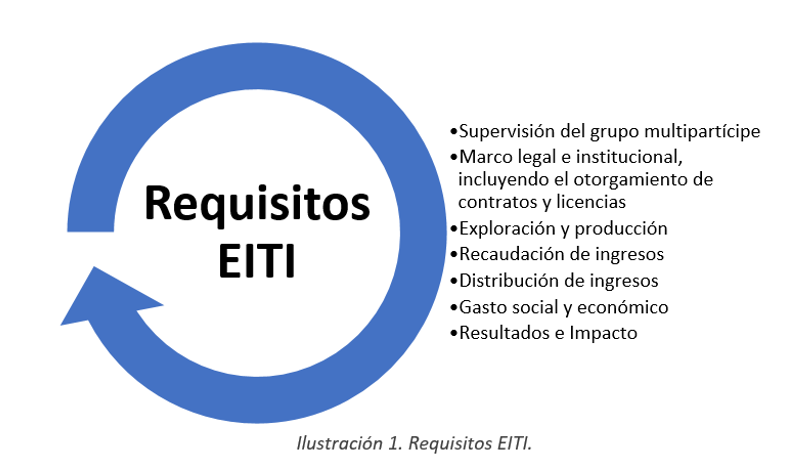Bogotá, December 29, 2022
The Civil Society Roundtable for Transparency in Industries Extractive presents to the general public the Civic Space in Colombia Report (2019-2022) presented in the framework of the EITI 2022 validation, which concludes that difficulties, risks, restrictions and alarms persist in the generation of an enabling environment for the effective participation of citizens in the governance of their natural resources, and shows how socio-environmental conflicts and violence in the context in which extractive industries operate generate fear and resistance on the part of civil society to exercise control, dialogue and use information from EITI reports in public decision-making processes. It also presents the document of EITI Colombia’s assessments and recommendations to EITI Colombia on 6 priority issues for civil societywith the The purpose of addressing the demands, needs and opportunities for improvement in the implementation of the standard in the country, so that these can be reflected in the National Action Plan (NAP) in the next term of the EITI Colombia process.
The Extractive Industries Transparency Initiative (
EITI
) is a global standard that promotes open and accountable management of oil, gas and mineral resources, and seeks to strengthen the governance of natural resources in the Colombian extractive sector. In our country, through a tripartite dialogue table, EITI Colombia seeks to consolidate relations and generate quality information by means of an articulated work between private companies, government and civil society. To this end, reports and some thematic studies on the management of emerging resources in the value chain of this industry are published annually, based on 7 requirements:
In 2022, the second EITI validation process began in Colombia. This process is a mechanism in which the country is assessed on its ability to comply with the provisions of the EITI Standard and the quality assurance of the information reported. Following the guidelines established by EITI at the international level for this purpose, the Civil Society Roundtable for Transparency in the Extractive Industries developed two key inputs to support its positions and the situation that citizens have historically faced in terms of access to information, participation and the search for transparency in the extractive industry.
The first document emerged from the work of the Mesa’s EITI subcommittee, in which 6 priority themes were selected based on the experiences of different civil society organizations at the national level. Based on them, research work was initiated to diagnose and evaluate key aspects, their progress and opportunities for improvement. Thus, in each of these items, a series of recommendations were formulated to address the gaps identified and strengthen the implementation of EITI in Colombia. Several of these recommendations were related to issues such as: disaggregation of data, institutional articulation, improvement of CTN governance mechanisms, use of clear language, implementation of a differential approach, development of training and advocacy strategies, adaptation to citizens’ demands for information, importance of a socio-environmental context and, especially, the inclusion of priority issues for civil society in the preparation of the next NAP.
The second is a detailed report on the status of Civic Space in Colombia, during the period 2019-2022, which was developed with the support and funding from
Publish What You Pay
-a global civil society network of which the Mesa is a member. This report is of great importance for the validation process, as it evaluates each component of the EITI Civil Society Protocol.
EITI Protocol for Civil Society
(expression, operation, association, participation, access to public decision making, available documentation) in Colombia. This document gathers interventions from Mesa organizations, external social organizations, grassroots communities, academia and experts. In this paper, the importance of placing greater emphasis on understanding the context experienced by communities and social leaders living in areas of influence of extractive operations is exposed, since, in practice, risks, fears and warnings are evident for their effective participation in decision-making scenarios, despite the existence of legal frameworks that provide that there must be legal guarantees in these scenarios. Since there are no spaces for debate, there is no use of the EITI information, therefore, recommendations are made, among others, to include the socio-environmental context, ensure the implementation of the Protocol for Civil Society, elaborate a protection strategy for social leaders, encourage the participation of ethnic communities and civil society organizations that are not members of the Mesa.
The Working Group invites you to read and use the information contained in these documents to reflect on the role of the EITI in the protection and promotion of citizen participation, the challenges of strategies for access and use of information, and the generation of spaces for dialogue and informed debate and its impact on the country.
About the Table
In the Civil Society Roundtable for Transparency in the Extractive Industries we promote citizen participation and access to information, with a platform of more than twenty social organizations and academic institutions from different regions of the country, which jointly carry out research, advocacy and citizen control activities regarding transparency in the extractive sector.
- Analysis of the civic space in Colombia within the framework of the EITI 2022 Validation process.
- Assessment and recommendations of priority issues for civil society EITI Validation 2022.
For more information, please write to: secretariatecnica@transparenciacolombia.org.co




